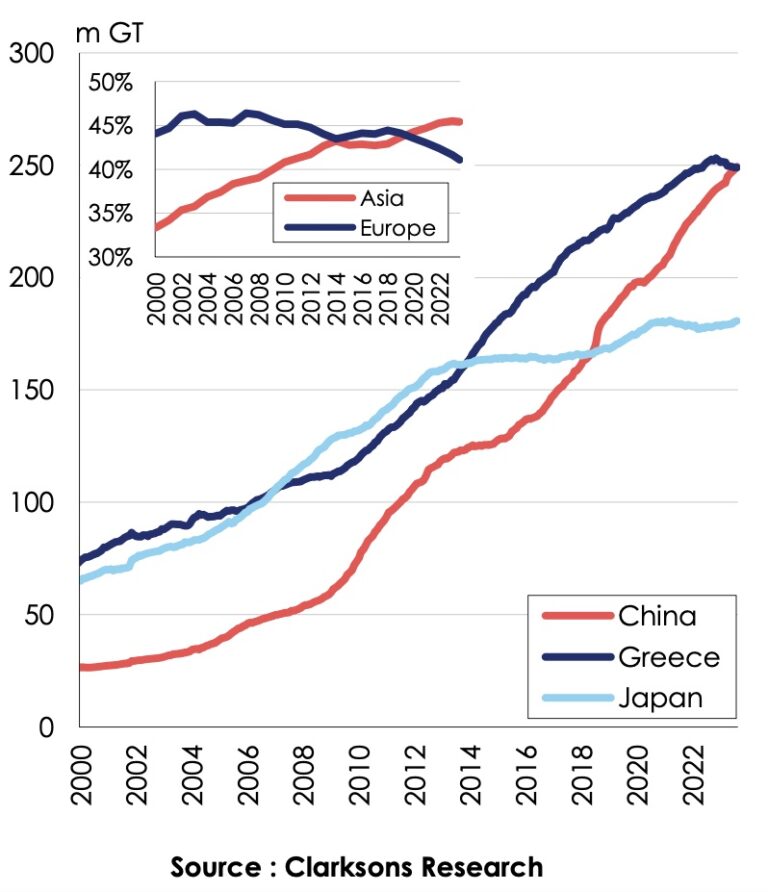China Surges Ahead of Greece to Become Leading Ship owning Nation by Gross Tonnage

Introduction
In a significant maritime shift, China has risen to the forefront of the global shipping industry, surpassing Greece to claim the title of the world’s top shipowning nation by gross tonnage. This transition underscores China’s persistent economic growth, strategic maritime investments, and its commitment to expanding its influence in the global maritime trade landscape.
China’s Maritime Ascension
For decades, Greece has held the esteemed position of the world’s leading shipowning nation, benefiting from a rich maritime history and a strong tradition of seafaring. However, China’s rapid ascent in various sectors of the economy, including shipping, is emblematic of its dynamic growth on the global stage. The Asian giant has capitalized on its economic prowess to invest in and develop a formidable fleet of ships, propelling it to the forefront of the industry.
Gross Tonnage as a Metric
The measurement of gross tonnage serves as a critical metric to assess a country’s dominance in the shipping realm. Gross tonnage represents the total internal volume of a ship, encompassing both cargo and the ship’s structural components. As of the most recent data available, China’s gross tonnage has exceeded that of Greece, illustrating its burgeoning fleet and its successful drive to secure a substantial share of the global shipping market.

Factors Behind China’s Success
Several factors have contributed to China’s surpassing of Greece in terms of shipowning by gross tonnage:
- Economic Growth and Industrial Capacity: China’s rapid economic expansion has fueled its ability to invest in various sectors, including shipping. The country’s immense industrial capacity has allowed it to manufacture and construct ships at a scale that few nations can match.
- State Support and Investment: The Chinese government’s commitment to maritime development has played a pivotal role. State-owned enterprises, with access to resources and favorable policies, have been instrumental in building and expanding the nation’s shipping fleet.
- Global Trade Dominance: China has become a global trade powerhouse, with its exports and imports necessitating a substantial shipping infrastructure. By owning a considerable portion of this infrastructure, China positions itself strategically to support its trade ambitions.
- Acquisitions and Collaborations: China has pursued acquisitions and collaborations with international shipping companies, allowing it to gain access to established networks and expertise. These partnerships have accelerated China’s growth in the maritime domain.
- Belt and Road Initiative (BRI): China’s ambitious BRI, focused on enhancing global connectivity through infrastructure projects, has further catalyzed its investments in shipping. Ports, shipping lanes, and maritime infrastructure are central to the success of this initiative, leading to expanded shipowning.
Global Implications
China’s rise to the pinnacle of shipowning has far-reaching implications for the global maritime landscape:
- Geopolitical Influence: As China solidifies its maritime presence, it enhances its geopolitical influence. Increased ownership of shipping assets gives the nation greater control over vital sea lanes, allowing it to exert more significant influence over global trade routes.
- Trade Dynamics: China’s dominance in shipping is a reflection of its status as a trading powerhouse. This dominance could potentially reshape trade dynamics, affecting both traditional partners and emerging markets.
- Technological Innovation: China’s investments in shipbuilding and ownership encourage technological innovation in the sector. The pursuit of efficient, eco-friendly, and automated ships can drive advancements that benefit the entire industry.
- Competition and Collaboration: China’s ascent will likely foster competition among shipowning nations, prompting them to invest in their own fleets. It also offers opportunities for collaboration, as nations seek to align their interests in the complex realm of maritime trade.
Conclusion
China’s elevation to the position of the world’s top shipowning nation by gross tonnage signals a profound shift in the global maritime hierarchy. The nation’s economic prowess, strategic investments, and commitment to maritime development have propelled it past Greece, a nation long synonymous with maritime excellence. As China’s influence in the shipping industry continues to expand, the world can anticipate a realignment of trade dynamics, technological innovations, and geopolitical considerations that will shape the future of global maritime trade.
Click here to join our Telegram chanel
You will get information, news, and support related to Merchant Navy.
